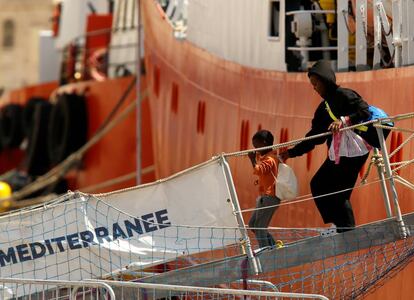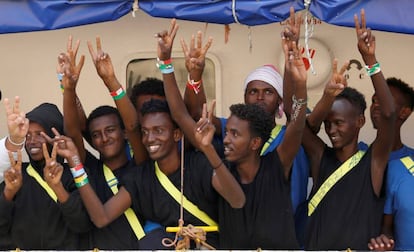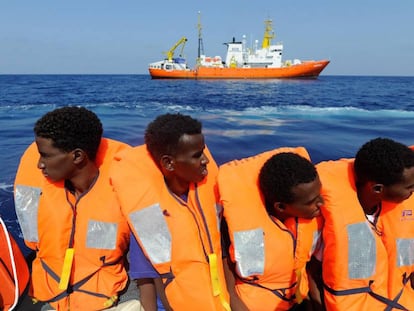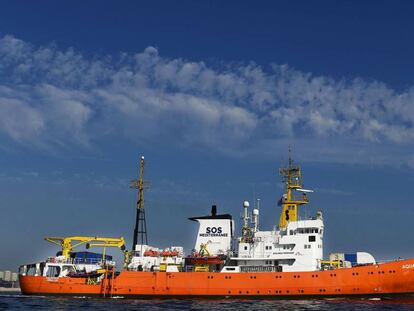UN: Europe¡¯s response to migrant crisis ¡°wrong, dangerous and immoral¡±
UNHCR refugee agency welcomes latest ¡®Aquarius¡¯ outcome but says a predictable disembarkation process is urgently needed


The second crisis of the NGO-run vessel Aquarius has come to an end with the 141 migrants on board now safely in Malta, from where they will then be sent to five European countries, with 60 to be taken in by Spain.
The United Nations High Commissioner for Refugees (UNHCR) has praised the agreement but has used the case to highlight the need for a ¡°predictable disembarkation mechanism¡± for migrants rescued at sea.
There is an urgent need to break away from the current run of impasses and ad-hoc boat-by-boat approaches
UN refugee agency head Filippo Grandi
¡°It is wrong, dangerous and immoral to keep rescue ships wandering the Mediterranean while governments compete on who can take the least responsibility,¡± said UN High Commissioner for Refugees Filippo Grandi.
The rescue ship Aquarius, chartered by French charities SOS M¨¦diterran¨¦e and Doctors Without Borders (MSF), was stranded in international waters for almost a week after it was turned back by Italy and Malta. This was the second time the two countries had denied the ship a safe port. In June, they also refused Aquarius entry, leading to a humanitarian crisis that was eventually resolved when the Spanish government agreed to take in the rescue ship and the 630 migrants on board.

The migrants on the Aquarius ¨C most from Eritrea and Somalia, and nearly half of whom are minors ¨C are now in a migrant shelter in the Maltese capital Valletta, but Grandi said that ¡°the situation should never have come to this in the first place.¡±
The head of the UN refugee agency has said a standardized regional approach is needed to address the uncertainty over what to do with migrants rescued at sea.
Around 1,500 people have died or disappeared in the Mediterranean Sea this year
¡°There is an urgent need to break away from the current run of impasses and ad-hoc boat-by-boat approaches on where to dock rescued passengers,¡± said Grandi. ¡°Only with clearly identifiable ports of safety will shipmasters feel confident when responding to distress calls that they¡¯ll be able to promptly disembark passengers, and won¡¯t become objects of lengthy negotiations.¡±
The Aquarius is just the latest protagonist in the political drama over migrant arrivals, which erupted after Italy banned all NGO, commercial and military vessels from disembarking migrants in the country. Italy had been the main destination point to drop off people rescued at sea and this change in policy has meant that Spain has become the main entry point into Europe.
While this latest crisis may have been addressed, it is still unclear what will happen to other migrants who are rescued at sea. Spain¡¯s maritime rescue team continues to save migrants from the Strait of Gibraltar and the Albor¨¢n Sea at a relentless pace. On Thursday alone, they rescued 524 people from 12 small boats.
European states must agree on a shared, predictable disembarkation mechanism for refugees and migrants rescued at sea. Meanwhile, it is wrong, dangerous and immoral to keep rescue ships wandering in the Mediterranean while governments compete on who takes least responsibility. pic.twitter.com/XKYk64p4xR
— Filippo Grandi (@FilippoGrandi) August 14, 2018
What¡¯s more, NGOs say that there are indications that ship captains are turning their backs on drowning migrants. According to MSF, the Italian Coast Guard sent out an alert on Monday to the Aquarius and other boats in the area that a ¡°rubber boat in danger¡± was entering an unknown point with 150 people on board: ¡°All ships are asked to remain alert and report if they see it,¡± it said. The warning was sent out three times in three days but ¡°no one helped it,¡± said the NGO.
In reference to the case, ?scar Camps, the founder of the Catalan rescue organization Open Arms, said ¡°this is what happens when humanitarian ships are deliberately blocked.¡±
Before the 141 migrants were rescued by the Aquarius, five ships had passed by and refused to help them, said MSF. Ships have a legal obligation to rescue anyone drowning at sea.
Since the beginning of the year, around 1,500 people have died or disappeared in the Mediterranean Sea, according to UNHCR. One in 17 people die in the sea crossing, compared to one in 43 in 2017. Since Italy joined Malta in closing its ports to migrant ships, the number of migrant deaths on the route to Italy has jumped substantially.
English version by Melissa Kitson.
Tu suscripci¨®n se est¨¢ usando en otro dispositivo
?Quieres a?adir otro usuario a tu suscripci¨®n?
Si contin¨²as leyendo en este dispositivo, no se podr¨¢ leer en el otro.
FlechaTu suscripci¨®n se est¨¢ usando en otro dispositivo y solo puedes acceder a EL PA?S desde un dispositivo a la vez.
Si quieres compartir tu cuenta, cambia tu suscripci¨®n a la modalidad Premium, as¨ª podr¨¢s a?adir otro usuario. Cada uno acceder¨¢ con su propia cuenta de email, lo que os permitir¨¢ personalizar vuestra experiencia en EL PA?S.
?Tienes una suscripci¨®n de empresa? Accede aqu¨ª para contratar m¨¢s cuentas.
En el caso de no saber qui¨¦n est¨¢ usando tu cuenta, te recomendamos cambiar tu contrase?a aqu¨ª.
Si decides continuar compartiendo tu cuenta, este mensaje se mostrar¨¢ en tu dispositivo y en el de la otra persona que est¨¢ usando tu cuenta de forma indefinida, afectando a tu experiencia de lectura. Puedes consultar aqu¨ª los t¨¦rminos y condiciones de la suscripci¨®n digital.










































